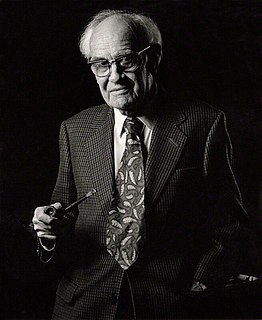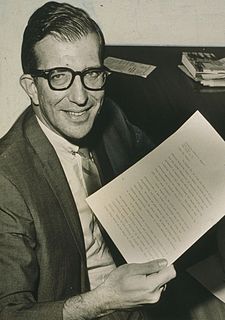John Pritchett may refer to:
John Pritchett may refer to:

John Milton Cage Jr. was an American composer and music theorist. A pioneer of indeterminacy in music, electroacoustic music, and non-standard use of musical instruments, Cage was one of the leading figures of the post-war avant-garde. Critics have lauded him as one of the most influential composers of the 20th century. He was also instrumental in the development of modern dance, mostly through his association with choreographer Merce Cunningham, who was also Cage's romantic partner for most of their lives.

Sir Victor Sawdon Pritchett was a British writer and literary critic.
Lant Pritchett is an American development economist. He is the RISE Research Director at the Blavatnik School of Government, University of Oxford.
Matt may refer to:

Deric J. Ruttan is a Canadian country music singer, songwriter and record producer from Bracebridge, Ontario, Canada. A Nashville, Tennessee resident, he has released four studio albums and has written or co-written more than 60 songs that have been recorded by other recording artists.
James Keith Pritchett is an association football player who represented New Zealand as a defender at both age group and senior international level. He is the son of former New Zealand manager Keith Pritchett.
Pritchett may refer to:
James Pigott Pritchett was an architect of London and York whose practice stretched from Lincolnshire to the Scottish borders.
Kelvin Bratodd Pritchett is a former American football defensive tackle in the National Football League for the Detroit Lions and Jacksonville Jaguars. He was a first round selection by the Dallas Cowboys in the 1991 NFL Draft. He played college football at the University of Mississippi.

Aaron Pritchett is a Canadian country music singer. He has one #1 hit on the Billboard Canada Country chart with "Better When I Do".
Music of Changes is a piece for solo piano by John Cage. Composed in 1951 for pianist and friend David Tudor, it is a ground-breaking piece of indeterminate music. The process of composition involved applying decisions made using the I Ching, a Chinese classic text that is commonly used as a divination system. The I Ching was applied to large charts of sounds, durations, dynamics, tempo and densities.
Cheap Imitation is a piece for solo piano by John Cage, composed in 1969. It is an indeterminate piece created using the I Ching and based, rhythmically, on Socrate by Erik Satie.

Sonatas and Interludes is a cycle of twenty pieces for prepared piano by American avant-garde composer John Cage (1912–1992). It was composed in 1946–48, shortly after Cage's introduction to Indian philosophy and the teachings of art historian Ananda K. Coomaraswamy, both of which became major influences on the composer's later work. Significantly more complex than his other works for prepared piano, Sonatas and Interludes is generally recognized as one of Cage's finest achievements.
Living Room Music is a musical composition by John Cage, composed in 1940. It is a quartet for unspecified instruments, all of which may be found in a living room of a typical house, hence the title.
Freeman Etudes are a set of etudes for solo violin composed by John Cage. Like the earlier Etudes Australes for piano, these works are incredibly complex, nearly impossible to perform, and represented for Cage the "practicality of the impossible" as an answer to the notion that resolving the world's political and social problems is impossible.

The New York City teachers' strike of 1968 was a months-long confrontation between the new community-controlled school board in the largely black Ocean Hill–Brownsville neighborhoods of Brooklyn and New York City's United Federation of Teachers. It began with a one day walkout in the Ocean Hill-Brownsville school district. It escalated to a citywide strike in September of that year, shutting down the public schools for a total of 36 days and increasing racial tensions between Blacks and Jews.
Modern Family is an American family sitcom television series created by Christopher Lloyd and Steven Levitan for the American Broadcasting Company. It ran for 11 seasons, from September 23, 2009, to April 8, 2020. It follows the lives of three diverse family set-ups in suburban Los Angeles, linked by patriarch Jay Pritchett.
John Pritchett is an American sound engineer for film. He has been nominated for two Academy Awards in the category Best Sound for the films Road to Perdition and Memoirs of a Geisha. He was nominated for two Cinema Audio Society Awards, winning best sound on The Road to Perdition. He was also nominated for a BAFTA Award for his work on There Will Be Blood. He has worked on over 100 films and television series since 1981, and is known for his work on such films as Dirty Dancing,Magnolia, There Will Be Blood and The Amazing Spider-Man.
James Pritchett may refer to:

Body of Work: A Collection of Hits is the first greatest hits album released by Canadian country music singer Aaron Pritchett. It was released by Big Star Recordings on May 12, 2015 and serves as Pritchett's first full-length release on the label. The compilation includes thirteen popular singles from Pritchett's second studio album through his sixth studio album as well as three exclusive tracks that were all released as singles. Pritchett is credited as a songwriter on nine tracks, including all of the releases from Thankful (2008) and In the Driver's Seat.